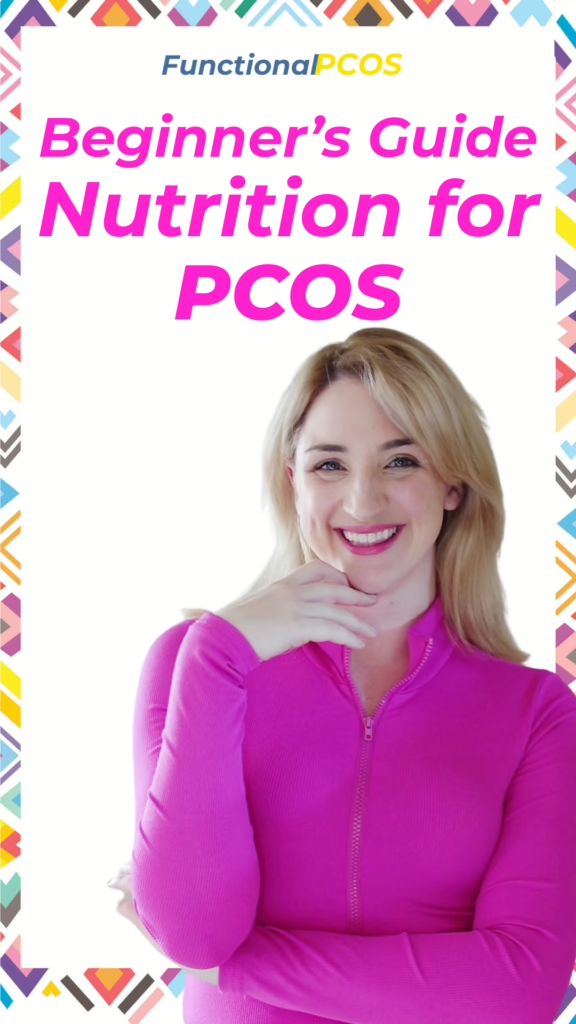The Beginner’s Guide to Nutrition for PCOS
Welcome to the beginner guide to nutrition for polycystic ovary syndrome (PCOS). If you’ve just been diagnosed with PCOS or suspect you have it, you’ve probably Googled every possible diet tip out there. Maybe you’ve even tried cutting out dairy, going keto, or living on smoothies because someone on TikTok said it would help. But let’s slow down for a second and zoom out.
This is your beginner guide to nutrition for PCOS written by someone who lives it, studies it, and works with it every single day. My goal isn’t just to tell you what to eat but to help you understand why your body reacts the way it does and how nutrition can become one of the most powerful tools in your healing process.
Why Does Nutrition Matter So Much in PCOS?
PCOS isn’t just about your ovaries. It’s a full-body metabolic condition that affects how your cells use insulin, how your brain signals hormones, how your gut processes nutrients, and how your liver detoxifies. When these systems are out of sync, it creates the perfect storm of symptoms- irregular periods, acne, weight gain, fatigue, mood swings, facial hair growth, and more.

Nutrition for PCOS isn’t about weight loss. It’s about helping these systems regulate themselves. In this beginner guide to nutrition for polycystic ovary syndrome, I’ll explain how the right food choices can lower inflammation, improve insulin sensitivity, regulate hormone levels, support ovulation, and even improve your fertility and mental clarity.
Common Pitfalls I See in PCOS Nutrition
Let’s just name a few mistakes I see all the time when someone first starts trying to eat for PCOS:
- Jumping into a restrictive diet without understanding the root cause of your PCOS
- Eating too little protein and fat, and too many refined carbs (hello, blood sugar crash)
- Assuming all carbs are bad and cutting them out entirely, which backfires later
- Eating “healthy” but still skipping meals or not eating enough calories
- Getting obsessed with supplements but not doing the food work first
If you’ve done any of those things, you’re not alone. Let’s build a smarter, more sustainable foundation.
What Should You Do First?
This is a beginner guide to polycystic ovary syndrome (PCOS) so let’s talk priorities first. When I work with clients, the first step in improving nutrition for PCOS is balancing blood sugar. If your blood sugar is crashing every afternoon, no amount of supplements or superfoods will fix the mood swings, cravings, or fatigue that follow.
1. Focus on Protein First
Protein is the most important macronutrient for managing insulin resistance. It slows the release of sugar into the bloodstream and reduces the insulin spikes that drive testosterone production in the ovaries.
Shoot for 20–30 grams of protein at every meal. That might look like a couple of pasture-raised eggs with chicken sausage, a high-protein Greek yogurt with chia seeds, or a salmon bowl with quinoa and avocado.
Your goal is to eat close to .8 of protein per pound of body fat, and at least about 100g a day. To bridge gaps in your diet (which happen super frequently) I recommend a good, PCOS friendly protein powder to ensure you’re getting enough. I usually add one of these as an afternoon or evening snack because it gives me an extra 30g and helps get me over that 100g mark. The Be Well by Kelly protein powder is my favorite for PCOS because it’s clean, high in protein, tastes super good, and is very low in sugar. It’s also great if you’re sensitive to dairy OR pea protein because it isn’t made from either. You can use code AMBER10 for 10% off. Find it here.
I like making my protein shakes in this electric cup or a blender to make sure they aren’t gritty!
2. No Naked Carbs
You’ve probably heard this phrase before but let me explain why it matters so much for PCOS. Eating carbohydrates on their own (like a banana or a bagel) sends a quick sugar rush to the bloodstream. That sugar spike triggers insulin, which in PCOS women, tends to stay elevated longer than it should and eventually leads to increased androgens “male hormones” like testosterone that cause many of the symptoms you’re familiar with like facial hair, irregular periods, and hair loss.
Pair every carb with a protein or fat. Banana? Add almond butter. Rice? Add beans and chicken. Crackers? Add cheese or smoked salmon.
3. Reduce (But Don’t Eliminate) Sugar
You don’t have to give up dessert forever. But added sugars especially in drinks and packaged snacks, create inflammatory spikes that make every PCOS symptom worse.
Start by cutting sweet drinks (even the organic ones). Opt for flavored electrolytes or herbal teas instead. I love recommending Ultima for hydration that actually supports adrenal balance. I’ll do an Ultima drink every night before bed to curb my snackiness after dinner. I also do one with a pinch of salt after a sweaty dance session or workout.
What Comes Next?
Once you’ve mastered those basics, you’re ready for the next layer of healing.
Add in Nutrient-Dense Veggies
Think of veggies as hormone helpers. They provide the fiber your gut bacteria need to flourish, which is essential for estrogen metabolism and regular cycles. They also provide magnesium, folate, vitamin C, and dozens of plant compounds that help your body detox gently and naturally.
Try to get 2–3 cups of non-starchy veggies daily. Roasted broccoli, sauteed kale, cabbage slaw, zucchini noodles, try new things and get creative. I’m not saying eat only salad (in fact, please don’t), but color and variety matter.
Add Targeted Superfoods for PCOS
Not all “superfoods” are worth the hype, but some have real benefits in PCOS:
- Spearmint tea can lower testosterone over time
- Flax seeds support estrogen balance
- Pumpkin seeds are high in zinc and support the skin and cycle
- Inositol (technically a supplement, but found in citrus and beans) helps ovulation and insulin sensitivity (this is my recommended brand of inositol because of it’s consistent dosing and high potency/safety)
Start Thinking About Root Causes | Beginner Guide to Nutrition for Polycystic Ovary Syndrome
Nutrition for PCOS should never be one-size-fits-all. There are different types of PCOS (insulin-resistant, adrenal, post-pill, inflammatory), and your diet should evolve to match what’s going on under the surface.
If you’ve already made good food changes but still feel exhausted or symptomatic, there may be deeper issues like:
- Gut dysbiosis or hidden inflammation
- Adrenal dysfunction and high cortisol
- Liver congestion and poor hormone detox/metabolism
- Thyroid dysfunction or nutrient deficiencies
This is where lab testing and functional nutrition come in. You don’t need to guess. You deserve to know what your body is dealing with.
I cover root causes in great depth, along with strategies for addressing your unique combo of root causes in my PCOS Foundations course. The course is designed for beginners to PCOS nutrition and would be a great place for you to start with making all these changes. I walk you through them step by step there! You can find the course and meal plan here.
Don’t Forget Stress and Sleep
This is the part nobody wants to hear, but I’m gonna say it anyway: no amount of nutrition change will fix chronic stress and sleep deprivation.
Poor sleep raises cortisol and insulin, and chronic stress rewires your brain’s hormone signaling. If you feel “wired and tired,” if your hair is falling out, or you wake up at 3am every night, this is your body waving a red flag.
Start small: consistent bedtime, daily morning light exposure, deep breaths before meals. I often recommend magnesium glycinate or L-theanine for clients struggling with stress recovery- these are evidence-based, gentle, and easy to find.
Final Thoughts on Nutrition for PCOS | Beginner Guide to Nutrition for Polycystic Ovary Syndrome
Nutrition for PCOS isn’t about perfection. It’s about support. You don’t need to do everything at once. You just need to take one step in the right direction, then another.
What you eat matters but how you live matters too. Your body isn’t broken- it’s talking to you.
And the more you listen, the more you’ll know exactly what to feed it.
I hope you learned some things from this beginner guide to nutrition for polycystic ovary syndrome (PCOS).
If you’re ready to go deeper, I’ve created a free download called the PCOS Nutrition Jumpstart Kit that you can grab when you sign up for my email list here.
And don’t forget to check out my Amazon storefront for PCOS-friendly kitchen tools, teas, and go-to snacks.
Healing PCOS isn’t just about discipline, it’s about understanding. And you, friend, are finally in the right place for that.
- Share on Pinterest (Opens in new window)Pinterest
- Share using Native toolsShareCopied to clipboard
- Share on Facebook (Opens in new window)Facebook

Beginner Guide to Nutrition for Polycystic Ovary Syndrome (PCOS)
Amber Fischer, MS, CNS, Functional Nutritionist
June 9, 2025
MEdical Disclaimer
The information contained on amberfischernutrition.com is for informational and education purposes only and should not be construed as medical advice. As a nutrition professional, I draw upon evidence based practices and personal experience with myself and clients to form recommendations like the ones made in this guide. You are an individual with your own unique set of health goals and concerns. Ensure you discuss any changes to your diet with a qualified healthcare professional, like your doctor, to ensure these changes are right for you. This is especially important if you have any other underlying medical conditions. Do not consume foods you are allergic to. Results will be individual and will vary.
Affiliate Disclosure
This site contains affiliate links. When you make a purchase through a link provided on this website, I may make a small commission. This does not add to the purchase price of the item. I only link to items I truly use and recommend.